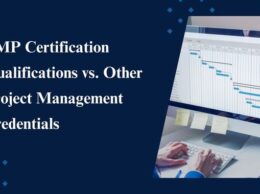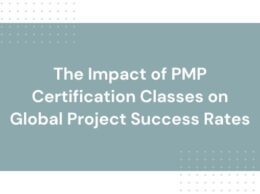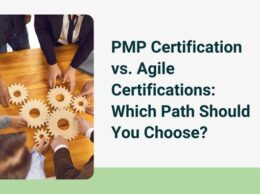When considering ways to boost your career, few steps offer as much potential return on investment (ROI) as obtaining the Project Management Professional (PMP) Certification. It’s not just about adding a credential to your resume; it’s a transformative decision that impacts your financial growth, skill development, and professional recognition. Let’s explore why PMP certification is worth every penny, effort, and hour spent.
Why PMP Certification Stands Out
- A Paycheck That Speaks for Itself
According to PMI’s Earning Power Salary Survey, PMP-certified professionals earn 16-33% more than their uncertified counterparts. For example, in the U.S., PMP holders command a median salary of $116,000, significantly above the industry average. This financial leap covers the cost of certification and then some, making it a lucrative choice. - Global Recognition and Validation
PMP certification is recognized worldwide as a gold standard for project management. It showcases your expertise in managing complex projects across industries, whether you’re working in IT, construction, or healthcare. Organizations like Google, Amazon, and NASA value PMP certification, often listing it as a requirement for senior roles. - Expanding Career Opportunities
By 2027, global industries will need 88 million project management professionals. PMP certification not only qualifies you for these roles but positions you as a preferred candidate. Whether you’re eyeing a promotion or planning to switch industries, PMP certification ensures your profile stands out.
The Intangible Benefits of PMP Certification
- Advanced Skill Development
PMP certification equips you with robust skills in leadership, risk management, and agile methodologies. The training and exam preparation focus on real-world scenarios, sharpening your ability to execute projects efficiently, lead teams, and mitigate challenges effectively. - Enhanced Professional Confidence
Completing the rigorous PMP certification process boosts your confidence and decision-making abilities. You’ll find yourself more assured in your leadership roles, translating to better team dynamics and project outcomes. - Networking and Community Access
As a PMP-certified professional, you join a global network of over one million members. This opens doors to exclusive PMI events, webinars, and forums where you can share insights, gain mentorship, and stay ahead of industry trends.
PMP Certification: A Strategic Investment
Let’s break it down with an ROI perspective. The cost of obtaining PMP certification (exam fees, training, and study materials) is approximately $2,000-$3,000. However, with an average salary bump of $15,000-$20,000 per year, you recoup your investment within months. Furthermore, the skills and career opportunities gained far exceed the monetary value, offering long-term professional growth.
How PMP Certification Boosts Industry Impact
- Improves Organizational Success
PMP-certified managers enhance project outcomes, reducing failures and maximizing efficiency. Companies with PMP-certified leaders report higher success rates, making them indispensable assets. - Future-Proofs Careers
With the rapid evolution of project management methodologies, PMP certification ensures you stay relevant. The emphasis on continuous learning helps you adapt to agile practices, emerging technologies, and global project management standards. - Fosters Personal Growth
Beyond professional gains, PMP certification fosters critical thinking, problem-solving, and resilience. It’s a testament to your commitment and perseverance, traits valued in every aspect of life.
Common Myths About PMP Certification Debunked
- Myth: PMP is only for those with years of experience.
Fact: While experience is a prerequisite, it’s achievable for early-career professionals with structured training and dedication. - Myth: The certification is too expensive.
Fact: The cost is a one-time investment that yields exponential career and financial returns.
Conclusion
PMP certification isn’t just a professional milestone; it’s a gateway to unparalleled opportunities. From higher salaries to improved leadership skills and global recognition, the benefits far outweigh the costs. As industries demand more skilled project managers, investing in PMP certification is one of the smartest career moves you can make. Start your journey today and unlock a world of possibilities.
FAQs
How long does it take to prepare for the PMP exam?
Most professionals spend 3-6 months preparing, depending on their familiarity with project management concepts.
What is the pass rate for the PMP exam?
Although PMI doesn’t disclose exact figures, a structured study plan can significantly improve your chances. Many aspirants pass on their first attempt with the right training.
Is PMP certification valid for life?
No, PMP certification requires renewal every three years through PMI’s Continuing Certification Requirements (CCR) program.
Can I pursue PMP certification while working full-time?
Yes, many candidates balance exam preparation with full-time jobs by dedicating 10-15 hours per week to study.
Does PMP certification help in remote work settings?
Absolutely! PMP principles are adaptable to virtual teams, making it a valuable asset in today’s hybrid work models.










